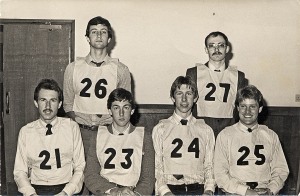I had an email from Jules of Figures in Comfort yesterday to tell me that on his own sponsored diet, he has managed to lose no less than 15lbs so far, so I offer my congratulations to him!
My effort has started slowly. When I stepped on the scales yesterday morning, the digits stopped whirring at 19st 13lbs (279lbs, 126.55Kg). That’s a loss of two pounds in my first week, which isn’t bad, but certainly isn’t anywhere near bragging territory yet.
I’ll be pleased if the rate of progress remains more or less at that level. Anyone with half a brain knows that it’s easy to go on a crash diet, lose an impressive amount of weight in a short time, only to see it pile back on again even quicker when the diet ends. The point is to actually make lifestyle changes so that what comes off, stays off.

As someone who used to be super-fit as a young man, my ever-growing waistline has been a source of embarrassment to me for many years. For quite a long time, I was a heavy smoker, too. I picked up the dreaded habit at university in late 1979, and only managed to finally quit for good about 11 years ago. For a while, I was up to a couple of packs a day, perhaps even 50 at times of greatest stress. I must have stunk like a chimney and of course a great deal of money quite literally went up in smoke. But the remarkable thing is that just before Christmas of 1997, I quit, cold turkey, and I’ve never smoked a fag since — I’ve not even had any craving.
If only, I have said to myself many, many times, I could flick that same switch in my brain in connection with my weight as I did with the smoking. It’s not quite so straightforward, of course, because the body can live without cigarettes, but it certainly can’t live without food! One of the terrible things the human body does is evolve, over quite a short space of time, to live without the levels of exercise one used to have as a young man, but it still keeps telling the brain that it needs the same amount of fuel. If we leave our car in the driveway for days on end, the petrol we bought on Monday will still be there in the tank on Friday (well, unless you live in certain high crime areas, that is!) But if we sit in front of a computer doing little else for weeks at a time, our body still processes what we eat and demands more at regular intervals. It makes little distinction about whether we’re surfing in Hawaii all day, or just surfing the Web.
One of the serious problems that this can cause is diabetes. It’s estimated that perhaps 10% of the UK population — even more in the United States — have undiagnosed Type 2 diabetes, or Syndrome X which can be a precursor to full diabetes. The source of the problem is the pancreas, which secretes insulin to deal with sugars in our blood. And our poor pancreases have been overloaded with excess sugars for years, whether those we consume overtly in the form of sweet foods; unwittingly in the form of refined flours, white bread, burger buns and so on; or even covertly, in the sugars added even to so-called ‘health’ or even ‘slimming’ foods. Oh, and in booze, of course: maltose, the natural sugar occurring in beers, has a shocking effect on our body (hence the ‘beer belly’) and many liqueurs and spirits are extremely high in sugars.

This preamble is by way of an introduction, for those interested, into the method I am using to lose weight. In general terms, it’s a GI (Glycaemic Index) diet. Various forms have been proposed over the years, most famously pioneered by Frenchman Michel Montignac whose famous first book “Dine Out and Lose Weight” delivered a well-deserved slap in the face to the calorie-counting establishment; Fedon Alexander Lindberg’s “The Greek Doctor’s Diet“; and TV chef Antony Worrall Thompson’s “GI Diet”. Put GI into Amazon’s search and you’ll be bombarded with titles, but all those by Michel Montignac stand head and shoulders above the rest.
What’s GI? Unlike calories, which measure of how much energy is derived when foodstuffs are burned, as though we should all take up eating flammable fare like machines, GI is a much more accurate indicator of the effect that foods have on our blood sugar level, and the amount of insulin that our pancreas needs to secrete to then return our blood sugar levels to normal. An even more accurate measure that is being developed is Glycaemic Load, which helps to highlight the fact that some foods that may have a great deal of naturally-occurring sugars in them and therefore have a comparatively high GI score (such as carrots), but they aren’t necessarily bad for you, because you’d have to eat an awful lot of them before you approached anything like the insulin spike produced by, say, a Mars bar! It also notes that the GI of foods can change when they are cooked, and according to how they are cooked. A raw carrot, for example, has a much lower GI than a boiled one, because the act of cooking makes the sugars more readily available to the body.
Incidentally, that insulin spike is something I bet you’ve experienced before, even if you didn’t know what it was. Ever had a typical, on-the-go office lunch of white bread sandwich, packet of crisps and a chocolate bar? And about 30-45 minutes later, did you suddenly feel really tired, exhausted even? Add a lunchtime pint to this, and I bet you were struggling to keep your eyes open, until your energy gradually returned an hour or two later. That, my friends, is the effect of gorging on high-GI food and drink. With all those sugars, both natural and artificial, suddenly hitting your system, your poor pancreas goes into overdrive, pumping out insulin into your blood like there’s no tomorrow.

One of the effects of insulin is soporific — it makes you feel sleepy. That’s perfectly natural; after all, your average lion takes a nap after snacking on a gazelle, which is an entirely organic, sugar-free meal. If gazelles were candy-coated, the lion would probably sleep for a week!
The other effect of high-GI foods is that they provide so much energy, so quickly, that your body says, “hey, all this other stuff that came with the roast potatoes/white bread/milk chocolate, I don’t need it for energy right now, so I’ll store it as — you guessed it — fat”.
Enough from me. The food and pharmaceutical industry cartels here in the UK have done a great job in brainwashing everyone into accepting calories as the indicator. After all, they’ve invested billions in all that low-calorie cr*p that costs twice as much as ordinary food to buy, everything from low-cal drinks to breakfast cereals to soups to microwave meals. On the other side of the world, however, the Aussies should be proud of taking a lead at the University of Sydney, which has set up the International GI Database website, free of charge for you to read and digest. I’ll end with a quote form their site based on what the World health Organisation (WHO) and the United Nations Food and Agriculture Organisation (FAO) recommend:
Terms such as complex carbohydrates and sugars, which commonly appear on food labels, are now recognised as having little nutritional or physiological significance. The WHO/FAO recommend that these terms be removed and replaced with the total carbohydrate content of the food and its GI value.
Incidentally, for those of you who imagine that I will be living an ascetic lifestyle for the next few weeks, let me tell you that two of my favourite things are allowed, in moderation: good red wine and very dark (70%+ cocoa) chocolate, both of which have a low GI!
Okay, the next post will be about wargaming, I promise!

Henry,
I have been doing something similar for awhile so the link you provided was of great interest to me. I did note however a link in the FAQ section of the site contains an article stating that there is no maltose in finished beer. The University of Sydney website further states that beer has no carbohydrates therefore no GI number is possible. Because there are calories in beer there is still good reason not to go overboard in drinking it, but in terms of GI indexing, it’s no different than wine or other alcohol beverages. All are OK in moderation.
Good show Henry. I started at 283lbs in January and am now down to 246. Nothing fancy, just exercise and eating according to the Canada Food Guide (which, as it turns out, emphasizes low GI food). Weird thing is that, after the first week, I hardly noticed the different and lesser amount of food. Only another 40 pounds to go for me. The new clothes are eating into my miniatures budget, though.
Am I the only one who thought ,
‘Bloody hell, Roger Utley looked rough when he was a schoolboy!’
Stll he was an exceptional player,for an Englishman.
All good stuff Henry, I know you will get there.
Bravo Henry – keep it up!